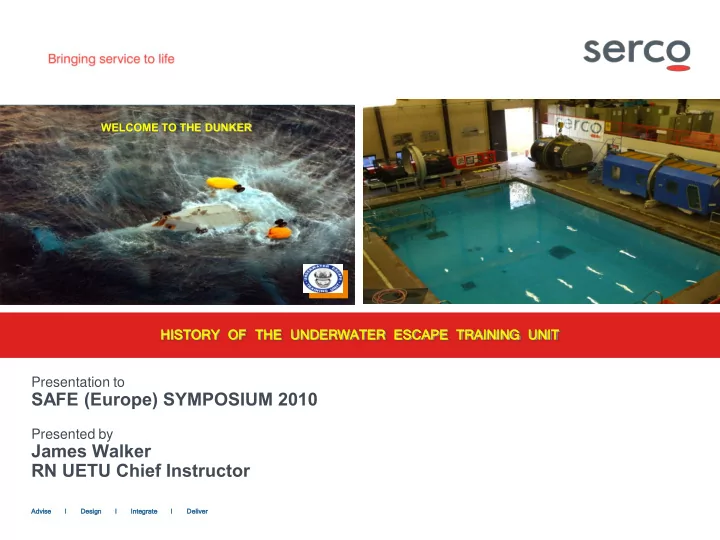

WELCOME TO THE DUNKER Ac Acti tion n / Impact Im act / C / Challe leng nge e / Re Resu sult lt / Micr cro o / Macr cro o / Input In Outp tput ut HIS ISTOR TORY OF THE UNDERWA WATER ESCAPE TRAINI INING G UNIT IT Presentation to SAFE (Europe) SYMPOSIUM 2010 Presented by James Walker RN UETU Chief Instructor Advise | Design | Integrate | Deliver
The Need 1955 to 1961: • 69 Naval aircraft crashed in to the sea with the loss of 56 aircrew • Only 12% of major aircraft accidents in the Fleet Air Arm but 52% of these were fatal • One third of the total fatalities on land and sea
The Need • 1971 – 1983: Over 27% of Military helicopter accidents involved water impact • 1972 – 1984: Water impacts accounted for 47% of RN helicopter accidents • 1972 – 1988: Out of 94 Military water impacts, 74 helicopters inverted • 82.6% of Military and 56.7% of civilian fatalities in survivable water impacts were the result of drowning
The Cure re • Improved ejection seats • Improved canopy / window release systems • The formation of the Search & Rescue diver sub branch A facility to practically train aircrew and passengers in emergency egress from ditched aircraft
st Dunker’ RN UETU ‘1 st HMS Vernon - Portsmouth • 7 staff consisting of: Chief Instructor Deputy 5 x Naval Airmen Ship’s Divers • Training up to 800 rotary wing aircrew annually
RN UETU during the 80’s HMS Heron - Yeovilton • 7 staff consisting of: Chief Instructor – SARD Deputy 5 x Naval Airmen Ship’s Divers • Training up to 1200 rotary wing aircrew annually
Short rt Term Air Supply ply System tem (STASS) S) 1992 – STASS introduced into Fleet Air Arm • Recompression Chamber (RCC) fitted to support STASS training • Chamber Supervisor required • Attendant required to operate the Shallow Water Escape Trainer (SWET)
RN UETU HMS Heron - Yeovilton •Manning levels on introduction of STASS: Chief Instructor Deputy Chamber supervisor Leading Airman 4 Naval Airmen Civilian maintainer - SERCO • Training up to 4000 students annually
RN UETU HMS Heron - Yeovilton •Current manning levels since 2006: Chief Instructor 6 UET Diver / Instructors Office Administrator • Training up to 6000 students annually
Module ule Desi sign Generic: Non-specific module design without windows or doors. Specific: Module designed to mimic specific helicopter types with windows and doors. Semi-specific: Vernon dunker was a semi-specific Wessex design without windows or doors. Controlled via hydraulic arm. Fully rotating.
HU HUET T De Design ign Small HUET Lynx specific Capacity -8 Large HUET Sea-King, Merlin, Chinook & Puma Capacity -12
HU HUET T De Design ign Specific Apache HUET
HU HUET T De Design ign Pin & & Break ak
Module ule Desi sign Heron dunker Up to 1992: Non-specific module design without windows or doors. Controlled via gantry crane. Fully rotating. 1992: Specific module design introduced within RN UETU (Sea King, Lynx) 1997: Merlin, Puma and Chinook module configurations introduced. 2005: Apache module introduced.
THE HE TEAM
STUDENT UDENT CA CAPACITY CITY Problems associated with Underwater Escape Training (UET). a. Psychological b. Physical Progressive training system. a. STASS Platform b. Shallow Water Escape Trainer (SWET) c. HUET Module practical training progression
STUDENT UDENT CA CAPACITY CITY 3 HUET groups 4-days per week 1-day per week dedicated to large troop groups 190 students per week. 9500 students per year 3000 STASS students per year
ADD DDITION ITIONAL L SUP UPPORT ORT ACT CTIVITIES ITIES UET Consultancy UET Staff training Remedial training
TRI RIALS ALS AEW PARACHUTE MERLIN MK1
BUO UOYANT ANT ASCE CENT NT TRA RAININ INING Sinus Barotraumas Confident breath hold Operation of Life-Jacket to aid ascent
Future re Deve velopme opments nts Land-Vehicle Underwater Escape Problems associated – Viking a. Abandon vehicle drill & rapid flooding b. Weapons & ‘Shark’ escape equipment
Future re Deve velopme opments nts Land-Vehicle Underwater Escape Problems associated – Warrior a. Psychological
Future re Deve velopme opments nts Land-Vehicle Underwater Escape Problems associated – Warrior a. Psychological b. Physical
Future re Deve velopme opments nts Land-Vehicle Underwater Escape. Problems associated a. Psychological b. Physical c. Trial design
Future re Deve velopme opments nts Land-Vehicle Underwater Escape. Problems associated a. Psychological b. Physical c. Trial design d. UET
Future re Deve velopme opments nts Passenger STASS (P-STASS)
Avo voiding ding PANIC
Ja Jamie.walk e.walker@p er@post.s ost.serco.co erco.com
Recommend
More recommend